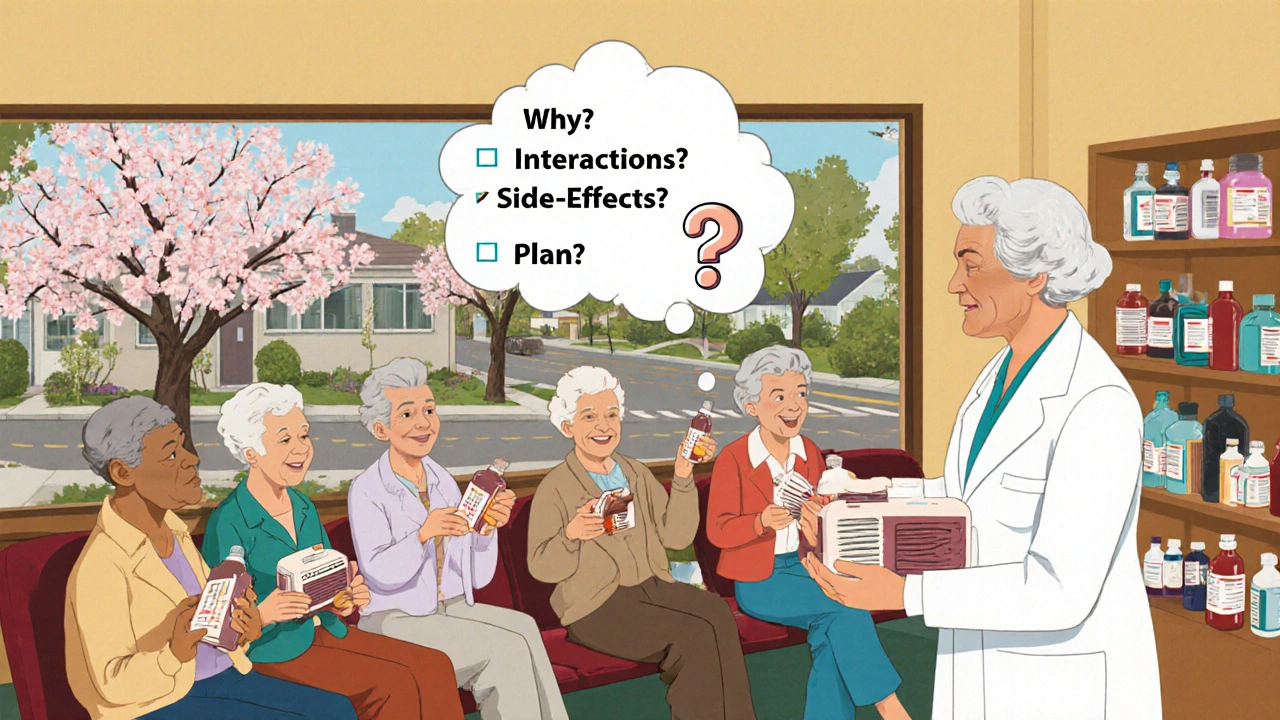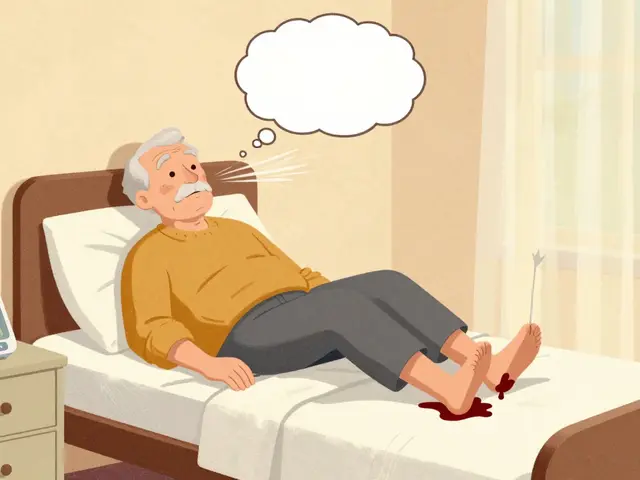Medication Interaction Checker
Check Your Medications
Enter the medications you take, including prescription drugs, over-the-counter medicines, vitamins, and supplements. We'll check for potential interactions.
Every year, millions of people take medications that aren’t working the way they should-or worse, are causing harm they didn’t even know was possible. A cough that won’t go away. Dizziness when standing up. Confusion after dinner. Fatigue that feels normal, until it isn’t. These aren’t just signs of aging. They’re often side effects from medications you’re taking, sometimes in combination, sometimes unnecessarily. And the person who can help you sort it out? Not your doctor. Not your nurse. It’s your pharmacist.
Why Your Pharmacist Is the Best Person to Review Your Medications
Your doctor sees you for 10 to 15 minutes. They’re focused on your diagnosis, your labs, your next test. They don’t have time to go through every pill in your medicine cabinet. But your pharmacist does. Pharmacists spend years studying how drugs interact, how they affect different bodies, and what side effects are often missed. They’re trained to spot the hidden dangers.In Canada, especially in places like Calgary, pharmacists are more than pill dispensers. They’re part of your healthcare team. Many offer free annual medication reviews. These aren’t just quick check-ins. They’re full clinical assessments-30 minutes or more-where a pharmacist sits down with you, reviews every single thing you take, and asks the hard questions: Why are you taking this? Is it still needed? Could this be causing your headaches?
The data is clear. In the U.S., over 1.5 million adverse drug events happen every year, costing $177 billion. Many of these are preventable. And in Canada, similar patterns show up: seniors on five or more medications are at the highest risk. One in two people don’t take their meds as prescribed. Why? Because they’re confused, overwhelmed, or afraid of side effects. An annual review fixes that.
What Happens During an Annual Medication Review
It’s simple, but powerful. Here’s exactly how it works:
- Bring everything. Prescription drugs, over-the-counter painkillers, vitamins, herbal supplements, even that magnesium you started for sleep. Don’t leave anything out. About half of patients forget to mention non-prescription items-and that’s where problems often hide.
- They ask you why you take each one. Not just what. Why? Maybe you were prescribed a sleep aid three years ago and never stopped. Maybe your doctor switched your blood pressure med, but you still have the old bottle. Maybe you’re taking two different pills for the same condition without realizing it.
- They check for interactions and side effects. Did you know that a common calcium supplement can make your heart medication less effective? Or that ibuprofen can raise your blood pressure and damage your kidneys if taken daily? Your pharmacist runs these checks in real time using clinical tools.
- They make a plan with you. Maybe they recommend stopping one pill. Maybe they suggest splitting a dose. Maybe they recommend switching to a safer alternative. They don’t decide for you. They give you options. You decide. And they write it down, send a summary to your doctor, and help you set up reminders.
One patient in Calgary, 72, came in feeling constantly tired. She was on eight medications. The pharmacist found she was taking two different blood pressure drugs that did the same thing. She was also taking melatonin and an antihistamine for sleep-both caused drowsiness. Together, they were making her exhausted. After cutting one drug and adjusting the timing of the other, her energy came back in two weeks. No new tests. No new prescriptions. Just a better plan.
Who Benefits the Most from an Annual Review
You don’t need to be elderly to need this. But if you fit any of these profiles, you’re a prime candidate:
- You take four or more long-term medications (polypharmacy)
- You’ve been hospitalized for a medication-related issue
- You’ve noticed new symptoms after starting a new drug
- You take supplements or OTC meds daily
- You have chronic conditions like diabetes, heart disease, or arthritis
- You’re 65 or older
- You’re caring for an aging parent and managing their meds
Here’s the truth: if you’re on five or more medications, your risk of a dangerous interaction increases by 50%. If you’re on ten, it’s over 80%. That’s not fear-mongering. That’s what the data from the CDC and the National Institutes of Health show. And it’s why annual reviews are now a standard part of Medicare Part D in the U.S.-and increasingly covered by private insurers in Canada.
What You Might Discover-Real Examples
People come in thinking they’re fine. They leave with life-changing insights.
One man in his late 60s thought his memory lapses were just getting older. He was taking a statin, a blood thinner, and an antacid. The pharmacist found his antacid was blocking absorption of his blood thinner, making it less effective-and his statin was causing muscle pain he’d been ignoring. He stopped the antacid, switched to a different cholesterol med, and his memory improved within weeks.
A woman with arthritis was taking four painkillers a day. She didn’t realize two of them were NSAIDs-same class, same risk. Her pharmacist helped her cut one, switch to a safer alternative, and add a stomach protector. Her stomach stopped hurting. Her kidney function stabilized.
Another patient was taking a sleep aid and an antidepressant. Both caused dizziness. She’d been falling near her bed. The pharmacist suggested switching to a non-sedating antidepressant and using a non-pharmaceutical sleep strategy. She hasn’t fallen since.
These aren’t rare cases. They happen every day. And they’re preventable.
How to Prepare for Your Review
It’s easy, but you have to show up ready.
- Bring all your medications in their original bottles. Don’t just list them. Bring the actual pills.
- Write down any new symptoms you’ve had in the last 6 months-even if you think they’re unrelated.
- Ask yourself: Do I even know why I’m taking this? If you can’t answer, bring that question.
- Know your pharmacy’s policy. Some offer free reviews. Others charge a small fee, but many insurance plans cover it.
- Bring a family member if you’re worried about forgetting details. Two sets of ears help.
Don’t rely on memory. Don’t trust your pill organizer if it’s outdated. Bring the bottles. Even if they’re half-empty. Even if you stopped taking them last year. That’s how they find the leftovers.

What Happens After the Review
The review doesn’t end when you walk out.
Your pharmacist will send a summary to your doctor-usually within 24 hours. They’ll flag any changes, recommend discontinuations, or suggest follow-ups. They’ll also give you a printed medication list with clear instructions: what to take, when, and why.
Many pharmacies now offer tools to help you stick to the plan: blister packs, automated refill reminders, or apps that alert you if a new prescription might interact with what you’re already taking. Some even sync all your refills to one day each month so you don’t have to make five trips to the pharmacy.
And if you need to change something? You can always go back. These reviews aren’t one-time events. They’re part of ongoing care.
Why This Matters More Than Ever
Canada’s population is aging. By 2030, one in five Canadians will be over 65. More seniors mean more medications. More medications mean more risk. And more risk means more hospital visits-often because of something that could have been caught in a 30-minute chat with a pharmacist.
Right now, only about 40% of seniors get an annual medication review. That’s too low. It’s not because people don’t want it. It’s because they don’t know it’s available-or they think it’s only for people who are sick.
It’s not. It’s for anyone who takes more than one medication. Even if you feel fine. Even if your doctor says everything’s okay. Because doctors aren’t trained to catch every interaction. Pharmacists are.
This isn’t about saving money. It’s about staying safe. About not mistaking a drug side effect for old age. About not falling because your meds made you dizzy. About not going to the ER because you took two pills that shouldn’t have been together.
It’s about control. Knowing what you’re putting in your body. Understanding why. Feeling confident.
Next Steps: How to Get Started
Here’s what to do next:
- Call your pharmacy. Ask if they offer annual medication reviews. Say: “Do you do comprehensive medication reviews for patients on multiple drugs?”
- If they say yes, book an appointment. Tell them you want to review all your meds, including supplements.
- If they say no, ask if they can refer you to a pharmacy that does. Many independent pharmacies and community clinics offer this service.
- Prepare your list. Bring your bottles. Show up. Ask questions.
- Follow up. If they recommend changes, make sure your doctor approves them. Then stick to the plan.
Don’t wait until you have a fall, a hospital visit, or a confusing symptom. Do it now. While you’re still feeling okay. Because the best time to prevent a problem is before it happens.
Is an annual medication review covered by insurance in Canada?
In many cases, yes. While not yet universally covered by provincial health plans, most private drug plans-including those for seniors, veterans, and employees-now cover annual medication reviews. Pharmacists often bill directly to your insurer. If you’re unsure, call your pharmacy and ask: "Does my plan cover a Comprehensive Medication Review?" Many pharmacies also offer the service for a small fee, often under $50, which is far less than the cost of a hospital visit.
Do I need to see my doctor before I can get a medication review?
No. You don’t need a referral. You can walk into any community pharmacy and ask for a medication review. Pharmacists are authorized to conduct these reviews independently. However, they will send a summary to your doctor to keep your records updated. If they recommend stopping or changing a prescription, they’ll coordinate with your doctor to make sure it’s safe and approved.
Can a pharmacist really stop my medication?
No, only your doctor can officially stop a prescription. But your pharmacist can strongly recommend it-and they’re often the first to spot when a drug is no longer needed or is causing harm. In many cases, doctors will follow the pharmacist’s advice, especially if it’s backed by clinical evidence. Pharmacists can also suggest alternatives or adjustments that your doctor can approve quickly.
What if I’m taking herbal supplements or vitamins?
Bring them. Always. Many people think supplements are harmless, but they’re not. St. John’s Wort can interfere with antidepressants. Garlic and ginkgo can thin your blood and increase bleeding risk during surgery. Vitamin K can cancel out blood thinners like warfarin. Pharmacists know which supplements interact with which drugs-and which ones are actually useless. They’ll tell you what’s safe, what’s risky, and what you can safely stop.
How often should I get a medication review?
At least once a year. But if you’ve had a recent hospital stay, started a new medication, changed your health condition, or noticed new side effects, don’t wait. Schedule a review right away. Medication needs change over time. What worked last year might not be right this year. Regular reviews keep your plan aligned with your current health.







David Cunningham
23 November 2025 - 13:03 PM
Been doing this for years in Sydney. My old man was on like seven meds and we thought his foggy brain was just aging. Turned out two of them were canceling each other out and the third was giving him insomnia. Pharmacist spotted it in 20 minutes. He’s got his energy back and sleeps like a baby now. Why don’t more people know about this?
Holly Schumacher
24 November 2025 - 23:46 PM
Ugh. This is why people are dying. I had a client who took melatonin + benadryl + lisinopril + amlodipine + simvastatin + glucosamine + turmeric + vitamin D. The pharmacist found three interactions that could’ve caused a stroke. And the doctor? Said ‘it’s fine.’ No. It’s not fine. This is malpractice by omission. Everyone on polypharmacy needs this review. Period. No excuses.
luke young
25 November 2025 - 05:44 AM
This is so true. My mom’s pharmacist did this last year and cut out two pills she didn’t even know she was still taking. One was from 2018. She said she felt like a new person. Honestly, I think every pharmacy should offer this for free. It’s cheaper than ER visits. And way more humane.
james lucas
25 November 2025 - 18:06 PM
so i just went to my pharmacy last week and asked if they do the med review thing and they were like ‘oh yeah we do that all the time’ and i was like wow i thought it was just a thing in the states? my pharmacist sat with me for 45 mins, looked at my whole cabinet, and found i was double-dosing on ibuprofen because i had two different brands and didn’t realize they were the same. also my ‘natural sleep aid’ had melatonin AND diphenhydramine in it. yikes. now i’m on a better plan and my head doesn’t feel like a balloon anymore. also they sent a copy to my doc so everything’s synced. why isn’t this mandatory??
Rahul Kanakarajan
26 November 2025 - 01:55 AM
Why are we even talking about this like it’s some revolutionary idea? In India, our local pharmacists have been doing this for decades. They know your entire family’s meds, your allergies, your habits. They don’t wait for you to book an appointment. They see you buying painkillers every week and say, ‘Beta, why are you still taking this? Your uncle died from kidney failure from this.’ They’re not just selling pills-they’re family. We don’t need fancy systems. We need respect for the person behind the counter.
New Yorkers
26 November 2025 - 21:52 PM
Let me ask you this: if your doctor can’t see the forest for the trees, why are we still treating them like the oracle of health? The pharmacist is the only one who sees your entire chemical ecosystem. The pills, the powders, the potions, the ‘just-in-case’ supplements you’ve been hoarding since 2012. They’re the real guardians of your biology. And yet, we treat them like glorified cashiers. We’ve inverted the entire healthcare hierarchy. Wake up.
Nikhil Chaurasia
28 November 2025 - 14:12 PM
I’ve seen this happen to my aunt. She was on eight meds. She didn’t say anything because she didn’t want to ‘bother’ anyone. Then she fell-twice. The pharmacist found she was taking two different blood pressure meds, plus a sleep aid that made her dizzy. She cried when she realized no one had asked her why she was taking them. I think we’ve normalized suffering. We need to stop that.
manish chaturvedi
30 November 2025 - 06:43 AM
As someone raised in a culture where elders are rarely questioned, I want to say this gently but firmly: your pharmacist is not an enemy. They are not trying to take your pills away. They are trying to help you live better. In India, we say ‘Dawa ka ilaj, dawa se nahi, samajh se hota hai’-cure comes not from medicine, but from understanding. This review is that understanding. Please, take it seriously. Not just for yourself-for your family, too.
Michael Fitzpatrick
1 December 2025 - 09:59 AM
Just wanted to say thank you for posting this. I’m 32 and on three meds for anxiety and blood pressure. I thought I was fine. Then I read this and realized I had no idea why I was on the blood pressure pill. I called my pharmacy and booked a review. Turns out my doc prescribed it after a temporary spike and never took me off it. I’ve been taking it for three years for nothing. I felt silly but also so relieved. I’m not old. I’m not sick. But I’m still human. And humans need to check in with their meds. This isn’t just for seniors. It’s for everyone who takes more than one thing. Seriously. Do it. You won’t regret it.